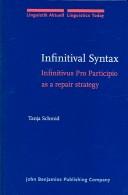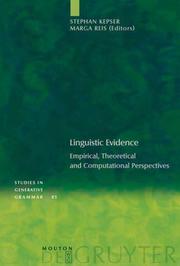| Listing 1 - 8 of 8 |
Sort by
|

ISBN: 1282156500 9786612156502 9027294216 9789027294210 9789027228031 9027228035 9027228035 Year: 2005 Publisher: Amsterdam Philadelphia John Benjamins Pub.
Abstract | Keywords | Export | Availability | Bookmark
 Loading...
Loading...Choose an application
- Reference Manager
- EndNote
- RefWorks (Direct export to RefWorks)
This monograph offers a new analysis of West Germanic 'Infinitivus Pro Participio' (IPP) constructions, within the framework of Optimality Theory. IPP constructions have long been problematic for syntactic theory, because a bare infinitive is preferred over the expected past participle. The book shows how the substitution of the past participle by the infinitive in IPP constructions can be captured straightforwardly if constraints are assumed to be violable. The basic idea is that IPP constructions are exceptional because they violate otherwise valid rules of the language. Thus, IPP is a 'last resort' or repair strategy, which is only visible in cases in which the past participle would be 'even worse' . Furthermore, as the choice of Optimality Theory naturally leads to a crosslinguistic account, the book systematically examines and compares infinitival constructions from seven West Germanic languages including Afrikaans, Dutch, German, West Flemish, and three Swiss German dialects.
Grammar, Comparative and general --- Germanic languages --- Language and languages --- Syntax --- Teutonic languages --- Indo-European languages --- Verb --- Infinitival constructions --- Infinitive constructions --- Infinitival constructions. --- Verb. --- Syntax. --- Verb phrase --- Verbals --- Reflexives --- Infinitive clauses --- Infinitive phrases --- Linguistics --- Philology --- Grammar, Comparative and general Syntax
Book

ISBN: 9783110829068 Year: 2013 Publisher: Berlin Boston
Abstract | Keywords | Export | Availability | Bookmark
 Loading...
Loading...Choose an application
- Reference Manager
- EndNote
- RefWorks (Direct export to RefWorks)
Digital

ISBN: 9783110829068 9783110169454 Year: 2013 Publisher: Berlin ;; Boston De Gruyter Mouton
Abstract | Keywords | Export | Availability | Bookmark
 Loading...
Loading...Choose an application
- Reference Manager
- EndNote
- RefWorks (Direct export to RefWorks)
Book

ISBN: 1282714430 9786612714436 3110217120 9783110217124 311020603X 9783110206036 9783110206036 Year: 2009 Publisher: Berlin Boston
Abstract | Keywords | Export | Availability | Bookmark
 Loading...
Loading...Choose an application
- Reference Manager
- EndNote
- RefWorks (Direct export to RefWorks)
In the 1980's generative grammar recognized that functional material is able to project syntactic structure in conformity with the X-bar-format. This insight soon led to a considerable increase in the inventory of functional projections. The basic idea behind this line of theorizing, which goes by the name of cartography, is that sentence structure can be represented as a template of linearly ordered positions, each with their own syntactic and semantic import. In recent years, however, a number of problems have been raised for this approach. For example, certain combinations of syntactic elements cannot be linearly ordered. In light of such problems a number of alternative accounts have been explored. Some of them propose a new (often interface-related) trigger for movement, while others seek alternative means of accounting for various word order patterns. These alternatives to cartography do not form a homogeneous group, nor has there thus far been a forum where these ideas could be compared and confronted with one another. This volume fills that gap. It offers a varied and in-depth view on the position taken by a substantial number of researchers in the field today on what is presumably one of the most hotly debated and controversial issues in present-day generative grammar.
Grammar, Comparative and general --- Generative grammar. --- Phrase structure grammar. --- Constituent structure grammar --- Grammar, Phrase structure --- Generative grammar --- Grammar, Generative --- Grammar, Transformational --- Grammar, Transformational generative --- Transformational generative grammar --- Transformational grammar --- Psycholinguistics --- Language and languages --- Word order --- Order (Grammar) --- Word order. --- Derivation --- Linguistics --- Philology --- Syntax. --- cartography.
Digital

ISBN: 9783110217124 9783110206036 Year: 2009 Publisher: Berlin ;; Boston De Gruyter Mouton
Abstract | Keywords | Export | Availability | Bookmark
 Loading...
Loading...Choose an application
- Reference Manager
- EndNote
- RefWorks (Direct export to RefWorks)
Book

ISBN: 1282188038 9786612188039 3110216159 9783110216158 3110213478 9781282188037 6612188030 Year: 2009 Publisher: Berlin Boston
Abstract | Keywords | Export | Availability | Bookmark
 Loading...
Loading...Choose an application
- Reference Manager
- EndNote
- RefWorks (Direct export to RefWorks)
The second volume of the two-volume set The Fruits of Empirical Linguistics focuses on the linguistic outcomes of empirical linguistics. The contributions present some of the insights that linguists can gain by applying the new methods: progress within language study is accelerated by the new evidence since language systems are more precisely captured. Readers will enjoy the fresh perspective on linguistic questions made possible by the evidence-based approach.
Computational linguistics --- Discourse analysis --- Methodology. --- Data processing. --- Empirical Linguistics.
Digital

ISBN: 9783110216158 9783110213478 Year: 2009 Publisher: Berlin ;; Boston De Gruyter Mouton
Abstract | Keywords | Export | Availability | Bookmark
 Loading...
Loading...Choose an application
- Reference Manager
- EndNote
- RefWorks (Direct export to RefWorks)


ISBN: 9783110197549 9783110183122 Year: 2008 Publisher: Berlin ;; Boston De Gruyter Mouton
Abstract | Keywords | Export | Availability | Bookmark
 Loading...
Loading...Choose an application
- Reference Manager
- EndNote
- RefWorks (Direct export to RefWorks)
| Listing 1 - 8 of 8 |
Sort by
|

 Search
Search Feedback
Feedback About UniCat
About UniCat  Help
Help News
News